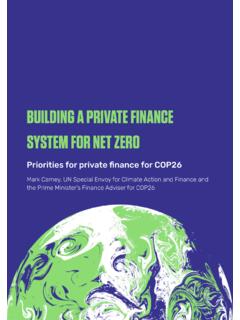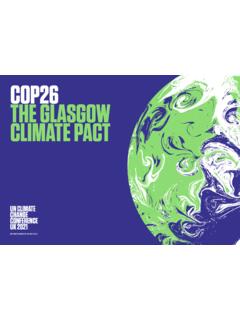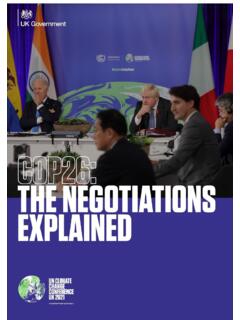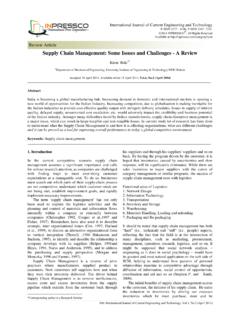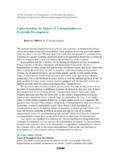Transcription of CLIMATE FINANCE DELIVERY PLAN: MEETING THE US$100 …
1 CLIMATE FINANCE DELIVERY PLAN: MEETING THE US$100 BILLION GOALCLIMATE FINANCE DELIVERY PLAN: MEETING THE US$100 BILLION GOAL 2A FOREWORD FROM THE HONOURABLE MINISTER JONATHAN WILKINSON AND STATE SECRETARY JOCHEN FLASBARTH ON THE US$100 BILLION GOALIn July 2021, we have accepted the invitation from COP26 President Designate Alok Sharma to co-lead the process of developing a CLIMATE FINANCE DELIVERY Plan, demonstrating how and when developed countries will meet the US$ 100 billion goal. While the DELIVERY Plan itself is delivered on behalf of all developed countries, we also want to take the opportunity to add our own remarks and observations on the process we carried out during the last four months up to the finalization of this product. CLIMATE FINANCE plays a critical role in supporting developing countries to address CLIMATE change.
2 We recognize the importance of delivering on the goal we set in 2009, and reaffirmed and extended in 2015, to mobilize jointly US$100 billion a year by 2020 and through 2025, to address the needs of developing countries in the context of meaningful mitigation actions and transparency on implementation. During the last decade, we have seen that developed countries remained committed to delivering on the US$100 billion goal. Since the goal was established in 2009, developed countries have significantly scaled-up support to developing countries. However, over the past several months, we have heard rising concerns that the US$100 billion goal was not met in 2020. We share the disappointment about this. Even though final figures for 2020 are not available yet, it is becoming clear that developed countries will not have mobilized US$100 billion jointly by that year.
3 The developed countries remain strongly committed to MEETING this goal. This is particularly important as the goal was set in the context of developing countries commitments to address CLIMATE change by supporting mitigation actions, and in recognition of the need to increase countries abilities to adapt to the adverse impacts of CLIMATE change. Hence, as we continue to urge all countries to enhance the ambition of their Nationally Determined Contributions, the significance of MEETING this goal cannot be overstated. Against this background, we have co-led a process to encourage additional CLIMATE FINANCE pledges prior to COP26 and to demonstrate how and when developed countries will achieve the US$100 billion goal. In doing so, we have been supported by the full group of developed countries contributing towards CLIMATE FINANCE .
4 We know that a transparent and consultative DELIVERY Plan showing how and when the goal will be met is key. This DELIVERY Plan aims to do just that: to provide clarity on when and how the US$100 billion goal will be met, with as much transparency as possible. We are aware that further work is needed from now until part of this process, developed countries have worked to increase their CLIMATE FINANCE pledges, with substantial new pledges from a number of countries, in order to ensure CLIMATE FINANCE ambition is at an all time high. In addition, forward-looking data on CLIMATE FINANCE has been collected from developed countries and multilateral development banks (MDBs) over the past weeks, and we have worked with the Organisation for Economic Co-operation and Development (OECD) and their expert analysis to develop aggregate forward-looking estimates of CLIMATE FINANCE in 2021-25 to get an estimate of when we will meet the goal.
5 Furthermore, we have conducted outreach with developed and developing countries alike to better understand expectations for the Plan. CLIMATE FINANCE DELIVERY PLAN: MEETING THE US$100 BILLION GOAL 3 The DELIVERY Plan reflects these collective efforts. Through it, we demonstrate progress made to date, outline our expectation that developed countries will make significant progress towards the US$100 billion goal in 2022 and express confidence that it would be met in 2023. The data also gives us confidence that we will likely be able to mobilize more than US$100 billion per year thereafter. This projection is based on pledges made by developed countries as of October 20, 2021. We recommend that the developed countries continue, in close cooperation with the recipients, to deliver on these pledges in the lead up to COP26 and after, including through increased private FINANCE mobilized.
6 Through our collective efforts, working alongside MDBs and the OECD, we have strived to ensure these projections are robust, while acknowledging the assumptions, uncertainties and challenges of forward looking data estimates and budget cycles. While MEETING the US$100 billion goal is of course critical, there are a number of other factors that are of great importance to CLIMATE FINANCE . This DELIVERY Plan therefore includes a number of guiding principles for collective actions that developed countries consider important based on what we heard during our outreach. These actions will help to ensure we reach the goal and steadily scale-up CLIMATE FINANCE , including on adaptation and grant FINANCE , transparency, predictability and private FINANCE mobilized. Importantly, this work does not replace related ongoing processes such as the Taskforce on Access to CLIMATE FINANCE being led by Fiji and the UK as well as the work of the UN Special Envoy on CLIMATE Action and FINANCE , Mark Carney, in accelerating the private sector s alignment and scaling up of investments in support of the Paris Agreement.
7 In this context, we also note that the work on all these important issues has to move forward in the months and years to these efforts, developed countries demonstrate that they remain committed to meet and deliver on the US$100 billion goal. We expect our mobilization efforts will create positive momentum for CLIMATE action in the coming weeks and months. As we heard in our consultations, transparency and predictability are key and we therefore encourage developed countries and MDBs who have not yet done so to continue coming forward with multiyear pledges to ensure predictability in CLIMATE FINANCE . We also recommend that the OECD continues on a regular basis with its analysis of CLIMATE FINANCE flows to support developed countries efforts. We would like to thank all of those who contributed to this effort, including the OECD and Sweden who greatly supported the technical and analytical input that made this DELIVERY Plan possible.
8 We look forward to continue the conversation at Honourable Jonathan Wilkinson Minister of Environment and CLIMATE Change Jochen Flasbarth State Secretary, Federal Ministry for the Environment, GermanyCLIMATE FINANCE DELIVERY PLAN: MEETING THE US$100 BILLION GOAL 4 EXECUTIVE SUMMARY Developed countries remain steadfast in our continued commitment to meet the annual US$100 billion goal as soon as possible and through 2025. In this regard, developed countries, co-led by Canada s Minister of Environment and CLIMATE Change, Jonathan Wilkinson, and Germany s State Secretary at the Ministry for Environment, Nature Conservation and Nuclear Safety, Jochen Flasbarth, have prepared a forward looking DELIVERY Plan on the US$100 billion goal through to 2025. Based on the analysis from the Organisation for Economic Co-operation and Development (OECD) of recent CLIMATE FINANCE pledges and historical levels of CLIMATE FINANCE , the outlook to 2025 shows a positive trend with developed countries making significant progress towards the US$100 billion goal in 2022 and provides confidence that it would be met in 2023.
9 The data also provides confidence that developed countries will likely be able to mobilize more than US$100 billion per year thereafter. To reach the goal effectively, guiding principles for collective actions by developed countries are outlined in this FINANCE DELIVERY PLAN: MEETING THE US$100 BILLION GOAL 51. INTRODUCTIONIn 2009, at the Conference of the Parties (COP) of the United Nations Framework Convention on CLIMATE Change (UNFCCC) in Copenhagen (COP15), developed country Parties committed, in the context of meaningful mitigation actions and transparency on implementation, to a goal of mobilising jointly US$100 billion a year by 2020 to address the needs of developing In this regard, Parties specified that the FINANCE would come from a wide variety of sources, public and private, bilateral and multilateral, including alternative sources of FINANCE .
10 The CLIMATE FINANCE goal was then formally recognized by the UNFCCC Conference of the Parties at COP16 in At COP21 in Paris, Parties extended the US$100 billion goal through 2016 and in response to COP21 decision 1 , developed countries provided a Roadmap on key factors and pathways to reach the US$100 billion goal. The Roadmap indicated that developed countries were on track to meet the CLIMATE FINANCE target by 2020. Since 2015, the OECD has regularly analysed the progress towards the CLIMATE FINANCE goal. The latest OECD report for 2019,4 released on September 17, 2021, indicates that even though CLIMATE FINANCE provided and mobilized has shown a stable upward trend, the US$100 billion goal will most likely be shown to not have been achieved in 2020 when the data is available.

